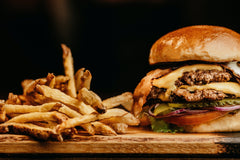
This Is Why You’re So Hungry After No Sleep
If you’ve ever had a bad night’s sleep and woken up feeling ravenous, there’s a very good reason. Although it can be hard to override the sudden surge in your appetite, there are ways to cope, and to combat the cravings without racking up the calories.
Amongst countless other benefits, a good night’s rest promotes a healthy balance of hormones, notably those that regulate appetite, digestion and metabolism.
Two hormones in particular, leptin and ghrelin play a crucial role in how we respond to food. When we don’t sleep properly, the same two hormones are impacted, causing changes to our appetite. Leptin, a hormone that balances your body’s energy levels by inhibiting feelings of hunger, while ghrelin is its counterpart, boosting appetite. When everything works as it should and we get enough sleep, these two exist in a state of harmony, creating a balance of appetite and satiation.
Sleep deprivation on the other hand, can affect the way leptin is released, which causes the brain to override other signals that the body is full. Add to this, increased levels of ghrelin, which rise after just one night of bad sleep, causing you to feel hungrier, and it’s easy to see why you might wake up feeling like you want to eat everything in sight. It’s also worth considering that the fatigue you feel when you don’t get enough sleep means you’re less likely to exercise.
Instead of reaching for the sugar, carbs or caffeine to sustain you through the day after a bad night’s sleep, try reaching for one of these healthy options instead.
Chia seeds
Apart from being a great source of protein which will help satiate your hunger and leave you feeling fuller for longer, chia seeds are high in magnesium which is an excellent stress and fatigue fighter. They also promote essential hydration, because they can retain large amounts of water, which is important for helping you feel more alert. To eat, mix with coconut yoghurt and leave to set in the fridge or add to a protein packed smoothie along with Workshop’s Organic Vanilla Pea Protein Formula.
Sweet potato
A healthy carbohydrate which will provide long lasting energy when you need it most, sweet potatoes are another a great source of magnesium, as well as vitamin C which helps transport fat into energy and keep you feeling switched on.



